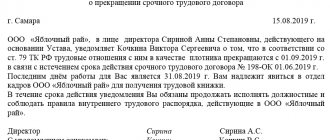From the article you will learn:
The employment contract for remote work in 2022 is concluded taking into account the changes provided for by Federal Law No. 407 of December 8, 2020, which came into force on January 1, 2021. Recently, this format of labor relations has become especially relevant. The rules regarding the procedure for regulating the work of people who work remotely were in the Labor Code of the Russian Federation even before the December amendments were introduced, but now the remote work mechanism has become more specific.
Labor legislation on remote work
Remote work assumes that the work performed by the employee is carried out by him in a location other than that created and controlled by the employer. The current edition of the Labor Code of the Russian Federation describes 2 options for such work:
- home-based (Chapter 49), in which the place of work for the employee is defined as his place of residence;
- remote (Chapter 49.1), when the place of work is not established and the employee has the right to choose it himself.
Both options have a lot in common:
- the relationship between a remote employee and an employer is based on the same provisions of the Labor Code of the Russian Federation that apply to ordinary employees, taking into account the peculiarities that arise due to the special nature of remote work;
- the employee may not appear at the employer’s location or visit there occasionally as needed, but is still considered to be at work;
- the time spent on work is not controlled by the employer, and the employee can regulate the periods of work and rest;
- the volume of work assigned to the employee must provide him with the opportunity to comply with the working hours established by law and alternate periods of work and rest;
- the means of labor involved in performing work may belong to both the employee and the employer;
- the employee is entitled to compensation for expenses incurred in the process of performing work, including for the use of property belonging to him;
- the procedure for interaction regarding the transfer of work assignments to the employee and the receipt of work results from him is specifically stipulated;
- for the employer, the list of his responsibilities towards the employee in terms of labor safety issues is limited to providing instructions, providing medical care and the need to investigate an accident with the employee, if one occurs, while he must provide homeworkers with special protective equipment and monitor their working conditions;
- The employment contract may include special grounds for dismissal.
Do you need to keep a time sheet for employees working remotely? Read the article “Do I need to keep a time sheet for a home-based employee?”
Attention! Since 2022, changes to the rules for registration and organization of remote work have come into force. ConsultantPlus experts have prepared a detailed review of the law that amended the Labor Code of the Russian Federation. Get free demo access to K+ and go to the review material to find out all the details of this procedure.
Differences in relationships with a teleworker and a homeworker
In addition to the generalities, there are a number of significant differences between home and remote work:
- a homeworker is tied to a specific place where work is performed, while a remote worker can perform work in any place convenient for him;
- a homeworker is allowed to involve his family members in the work, while a remote worker does the work himself;
- a home worker creates things of a material nature that require the investment of initial material costs in them, and work of a remote nature leads to the creation of intellectual products;
- working as a homeworker requires direct interaction with the employer when receiving source materials from him (if they are provided by the employer) and transferring finished products to him, and with a remote worker all such interaction is carried out via electronic means of communication;
- For a remote worker, the following may be established: a work schedule agreed with the employer;
- the right to use an enhanced qualified electronic signature of created documents;
- special conditions in terms of labor protection, ensuring the labor process, and providing vacations.
Part-time work with the possibility of remote work
The Labor Code of the Russian Federation does not contain a ban on remote work for part-time workers. When concluding an agreement on such work with a part-time worker, you should remember the rules established by Chapter. 44 of the Labor Code of the Russian Federation, by virtue of which for a part-time worker:
- working time is defined as half the normal working day, and, accordingly, the amount of work performed by him will be half that of an ordinary employee;
- vacation is granted simultaneously with vacation at the main place of work;
- The guarantees provided to persons: working in the Far North regions do not apply;
- combining work and study;
- termination of the contract is possible with a 2-week notice in case of hiring another employee to perform the same functions, registered at his main place of work.
Read more about the specifics of registering for a part-time job in the material “How to properly register a part-time job according to the Labor Code of the Russian Federation?”
Peculiarities of registration of personnel documents during remote work
Hiring an employee for remote work does not relieve the employer from the obligation to exchange documents with him in order to:
- obtaining from the employee all necessary information about him;
- provision by the employee of originals and copies of documents relevant for employment and further payment of wages;
- drawing up an employment contract signed by both parties and possible additions to it;
- familiarizing the employee with internal regulations against signature;
- receipt by the employee of certificates from the employer.
ATTENTION! As of April 1, 2019, an insurance certificate will not be issued. Instead, a document was introduced confirming registration in the individual (personalized) accounting system and containing information about the insurance number of the individual personal account. If an employee enters into an employment contract for the first time, he must independently obtain a document confirming registration in the individual (personalized) accounting system.
But if such an exchange with a homeworker can be made through direct contact at the time of receiving materials for work or transferring finished products, then for a remote worker this method is not always available. Therefore, interaction with him and in relation to personnel documents is allowed to be carried out using electronic means of communication. In this case, the documents that the employee must submit to the employer in the original must be sent by regular mail by registered mail with notification.
For other documents, the following electronic exchange options are possible:
- through regular electronic correspondence followed by sending by mail those papers that the employee and (or) employer need to have in the original;
- using electronic documents signed with an enhanced qualified electronic signature, and the recipient must send a response confirmation.
Using electronic documents it is allowed to:
- familiarization with internal regulations;
- filing applications;
- providing explanations.
How to conclude an employment contract for remote work?
An employment contract or additional agreement providing for the performance of a labor function remotely can be concluded in a standard or electronic way. In the second case, the parties do not need to hold personal meetings; it is enough to exchange electronic documents. For such an exchange, the employer must possess an enhanced qualified signature, and the employee must possess an enhanced qualified or non-qualified signature.
All documents that a person must present when applying for a job (passport, certificate, military ID, etc.) can be sent electronically. However, the employer reserves the right to require notarized copies of these papers.
Familiarization of a newly hired employee with internal labor regulations, a collective agreement and other local acts can also be carried out through electronic exchange.
The employee has the right to request a paper copy of the employment contract or additional agreement. To do this, he must prepare a corresponding application and send it to the employer. The latter has 3 days to send the requested papers.
Note! Those remote workers who got a job for the first time independently receive documents from the Pension Fund confirming registration in the individual personalized accounting system (SNILS).
Differences between a contract with a remote employee and a regular employment agreement
An employment contract with a remote worker is mandatory (Article 312.1 of the Labor Code of the Russian Federation). However, the special conditions for remote work and the opportunities provided by current legislation determine the existence of a number of differences between such an agreement and an agreement with an ordinary employee. In a contract with a remote worker:
- an indication of the remote nature of the work is required, and the location of the employer is indicated as the place of conclusion of the contract;
- there is a condition about not registering a work book, if such an agreement is reached;
- a certain work schedule is established, if this is important for the employer, and a procedure for granting vacations;
- stipulates the need to issue an enhanced qualified electronic signature if such a signature is needed by the employee for work;
- contains a list of technical means and software that the employee must use in his work, if such a clause is necessary, and also provides a list of the means of labor transferred to the employee, if such transfer is carried out by the employer;
- reflects the amount of compensation for the use of property owned by the employee and used to perform remote work, as well as other expenses arising in connection with this work;
- the procedure for exchanging work assignments and the results of their implementation is established;
- additional responsibilities of the employer regarding labor protection issues are determined, if necessary;
- the conditions of dismissal are reflected, supplementing the list of reasons contained in the Labor Code of the Russian Federation, if a decision is made to include them in the text of the document.
What is remote work?
By remote or remote work we mean the employee performing his labor functions outside the location of the employer, outside the stationary work location. In other words, a person works where it is convenient for him - at home, in a cafe or in a park. Communication between the employer and the hired person is carried out using the Internet, telephone or other public networks.
In general, stationary and remote workers performing similar job functions have the same rights and responsibilities. A person who works remotely is also subject to general labor guarantees. However, certain features still exist, since this implies the way of working itself.
A person can immediately be hired as a remote employee, or he can switch to remote work after working at a stationary workplace. The legislator also allows for periodic alternation between remote work and the office and forced transfer during emergencies and other unforeseen circumstances.
Note! Not every employee can switch to a remote format. This depends primarily on the specifics of the labor function. While it is quite easy to transfer an accountant or customer acquisition manager to remote work, it is simply impossible to imagine working as a car mechanic, a maid or a supermarket cashier outside of a stationary workplace.
Table No. 1. Types of remote work according to the current Labor Code of the Russian Federation.
| View | Peculiarities | Article of the Labor Code of the Russian Federation |
| Constant | The employee is employed remotely during the entire period of the employment relationship | Part 2 Art. 312.1 |
| Temporary | A person works remotely for a specific period of time, but not more than six months | Part 2 Art. 312.1 |
| Periodic | Periods of remote and stationary work alternate | Part 2 Art. 312.1 |
| Forced | Allowed in exceptional cases (natural or man-made disaster, accident, fire, flood, decision of a public authority) without the consent of the employee | Art. 312.9 |
Employment contract for a remote worker - sample
An employment agreement concluded with a remote worker, like a contract with a regular employee, has a free form, but must contain the mandatory information provided for in Art. 57 of the Labor Code of the Russian Federation, taking into account the features that distinguish remote work from regular work.
For information about what constitutes the content of an employment agreement, read the article “Procedure for concluding an employment contract (nuances).”
A sample employment contract for remote work in 2022 can be viewed on our website.
Resources required for work
An employment contract for remote work must include a clause on providing the employee with everything necessary to perform the job (equipment, software, information security tools, etc.). In the end, the Internet is no longer a headache for the employee, but for the employer. In any case, according to the law, the employer must provide those who work remotely with everything necessary to carry out their professional duties.
If an employee sets up his own production process using his own resources, then he is paid compensation along with his salary. This procedure is prescribed in Article 312.6 of the Labor Code of the Russian Federation. So, for using his computer, an employee must receive another 2,000 rubles in his salary every month.
By the way, when management compensates an employee’s expenses, it has the right to dictate which software and hardware tools to use.
In most cases, the employer provides everything necessary for its “remote workers” and saves on office rent.
Taking into account the fact that this form of work has been legalized, it is no longer profitable for many to gather a team in the office and rent large premises for this. A carefully drafted employment contract with a remote worker provides guarantees for both parties.
Results
The labor legislation of the Russian Federation allows for the possibility of working outside the location of the employer.
Such work has two varieties (home-based and remote), which have both common features that distinguish this work from ordinary work and their own characteristics. Remote work is distinguished by the predominance of electronic forms of interaction and the possibility of not filling out a work book. An employment contract with a remote worker is drawn up in the usual manner, but with the inclusion of provisions in its text that require agreement between the employee and the employer due to the special nature of the work. You can find more complete information on the topic in ConsultantPlus. Free trial access to the system for 2 days.
Let's sum it up
- An employment contract with a remote employee can be concluded both on paper and by exchanging electronic documents.
- Mandatory for inclusion in a remote worker’s employment contract are clauses on the schedule and place of work, the procedure and timing for providing the employee with the necessary equipment and software, the procedure and timing for submitting reports on the work done.
- After concluding an employment contract (when exchanging electronic documents), the employer is obliged to send a paper copy to the employee by mail within 3 days.
- A provision regarding the remoteness of the work performed must be included in the contract.








